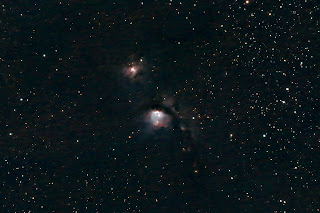Since last year, my processing has gotten much better and the camera was modified (Hap Griffin) over the summer. I went out on 1/30/17 using my CLS filter and collected 19 x 4 min exposures. I also went out on 2/2/17 and collected 14 x 3 min exposures, however, this time I did not use the CLS filter. I wanted to see if there was a big change in data acquisition. I should mention that the moon was low but still up (37%) when I imaged without the filter.
I went through the original images from 2016 and eliminated some of the subframes as they were poor quality. My standards have changed, hopefully for the better.
Conclusions:
The preliminary results are much improved with the additional time and better processing (compare Fig 1 with Fig 2). As far as with the filter vs. without the filter, it is a hard call. The was significant more sky glow without the filter which washed out some of the data especially in the center of the image. This can be seen if you compare Fig 2 with Fig 3. The maximum exposure for the unfiltered image was 3 min where as with the filter I could safely go for 4 or 5 min. When I do another session for M78, I will use a filter as I am avoiding a significant amount of sky glow. The only draw back is longer imaging sessions.
General Conclusion the UHC Filter, CLS Filter, or no filter:
Emission Nebula - UHC (narrow band)
Reflection Nebula - CLS (broad band)
Star Clusters - No filter (CLS - if moon is full)
Galaxies - Haven't tested
Figure 1 - Original (2/28/16 - 82 min, 2/29/16 - 20 min)
Figure 2 - 32 subframes (2/28/16 - 75 min, 1/30/17 - 76 min)
Figure 3 - 32 subframes (2/28/16 - 75 min, 1/30/17 - 76 min, 2/2/17 - 42 min)
Figure 4 - 32 subframes (2/28/16 - 75 min, 1/30/17 - 76 min, reprocessed)
M78
Location: Happy Frog Observatory, Monroe, CT
Date/Time: 2-28-16, 9:45 pm; 2-29-16, 9:45 pm*; 1-30-16, 10:45 pm; 2-2-16, 10:45 pm
Camera: Canon EOS Rebel T3i(a), Backyard EOS
Telescope: Orion ED80 80mm f/7.5 Apochromatic Refractor Telescope
Barlow: None
Focal Length: 600mm
f/7.5
Mount: Orion Sirius EQ-G GoTo Telescope Mount
Filter: Astrodon UV/IR, Astronomik CLS
Autoguiding: QHY-5L-II-M attached to an Agena 50mm Guide Scope with Helical Focuser
Exposure:
2-28-16: 16-300s,1-163s,
2-29-16: 4-300s, 3-180s, 1-45, 1-30s* (not used in reprocessing - poor quality)
1-30-17: 19-240s
2-2-17: 14-180s
2-29-16: 4-300s, 3-180s, 1-45, 1-30s* (not used in reprocessing - poor quality)
1-30-17: 19-240s
2-2-17: 14-180s
ISO: 800
Temp: -2.2 C (27 F)
Post Processing: Deep Sky Stacker, Photoshop, Gradient Exterminator, Astronomy Tools
Temp: -2.2 C (27 F)
Post Processing: Deep Sky Stacker, Photoshop, Gradient Exterminator, Astronomy Tools





No comments:
Post a Comment